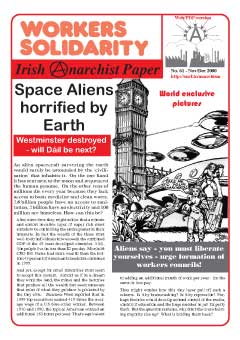Over 30 years of anarchist writing from Ireland listed under hundreds of topics
The 'polluter pays' argument & the bin tax
The attempt to introduce refuse charges by the Dublin area county councils has been welcomed in some quarters. It is, we are told, necessary to fund a local waste management policy, that will increase the amount of waste recycled, and reduce the amount of landfill needed.
AN UNFAIR TAX
At first glance this makes sense as a way of making the polluters pay for the cost of their waste. But when it comes to local charges there's one problem - we've already paid. When council charges were abolished in the 70's they were replaced with an increase in other taxes. The extra money this raised for the government was supposed to be passed back to the councils, but wasn't. Is it our fault Charlie McCreevy's tight? Even if the VAT increase was withdrawn, there's another huge problem with passing the cost of waste back to us - we're not the polluters. Of the 42 million tonnes of waste produced every year in Ireland, less than 5% is household waste. Three-quarters of it comes from farmers, the other 20% from industry. If we're going to follow the 'polluter pays' principle, we're the last people who should have to cough up, but apparently PAYE workers, who already pay an unfair proportion of taxes, are just going to have to pay some more.
So the charges are not targeted at those who produce the most waste, but will they lead to a better waste policy? At the moment incineration plays a large part in council plans. But, as they have discovered around the country, people will not allow incinerators to be built in their areas. There are simply too many questions about the dioxins produced by incineration, some of which have been linked to cancer. The other option is recycling.
RECYCLING
The four Dublin councils say they plan to recycle 60% of their waste (5% is recycled at the moment). But how committed are they to the idea? At almost the same time as Dún Laoghaire/Rathdown council announced the introduction of refuse charges, the Kerbside recycling company went bust. Apparently the council didn't think recycling was important enough to give Kerbside the small subsidy it needed to keep going. Of course, we'd end up paying for it either way - either in increased refuse charges to keep the recycling companies profitable, or in higher taxes to subsidise those companies.
If the councils plan to recycle waste, it's because they see it as the easiest option, the one that is most likely to win public support. They hope that we will be less likely to complain about refuse charges if they seem to have a 'green' policy. But still, why are we the ones paying for it?
We have little choice in the (small) amount of waste we produce. Unless we change our lifestyles drastically, we will have to buy the same products from the same companies, with all the excess packaging they include. We have no control over this packaging - you can't go to the supermarket and ask for a refill of your jar of coffee, or bottle of washing-up liquid. The decision to wrap food in a bag in a box in a bag is not ours - we're not the polluters.
PROFIT OR ENVIRONMENT?
There is a fundamental conflict between our desire for a clean environment and the greed of businesses for profit. As well as unnecessary packaging, businesses spend over 400 billion dollars a year on advertising, to try to persuade us to buy their products instead of their competitors' near-identical product - how much energy, how many resources, are consumed by this industry that produces nothing useful? In industry, companies will happily ignore the pollution they create if it helps keep costs down. It has its own jargon - 'externalising costs' - in other words, putting the cost of pollution onto the outside community. This is all done with the connivance of government. In the mid 1990's governments met to decide a response to global warming, and agreed a treaty that was supposed to reduce the number of greenhouse gases produced. But these were not the strict limits some of us imagined at the time, because it allows richer countries to buy pollution allowances from countries that don't use them. As usual, these laws are for the poor, they don't apply to the rich.
In this context, the issue of domestic waste is almost irrelevant. It accounts for only a tiny fraction of the overall level of waste, and even that fraction isn't really under our control. But it is this fraction that the government focuses on, telling us we are all equally to blame for the state of the environment, using it as an excuse to raise our taxes and distract us from the real causes of pollution.
Instead of feeling guilty for not recycling teabags, we must act to stop the real causes of pollution. In the refuse charges campaign, this means arguing that the real polluters should pay for the waste disposal, not the workers who already pay enough tax. It means stopping companies from passing on the cost of their pollution to us. It means taking society back, so that we organise production based on need, not profit, and stop using our environment as a dumping ground.
This page is from the print version of the Irish Anarchist paper 'Workers Solidarity'.

This edition is No61 published in November 2000

